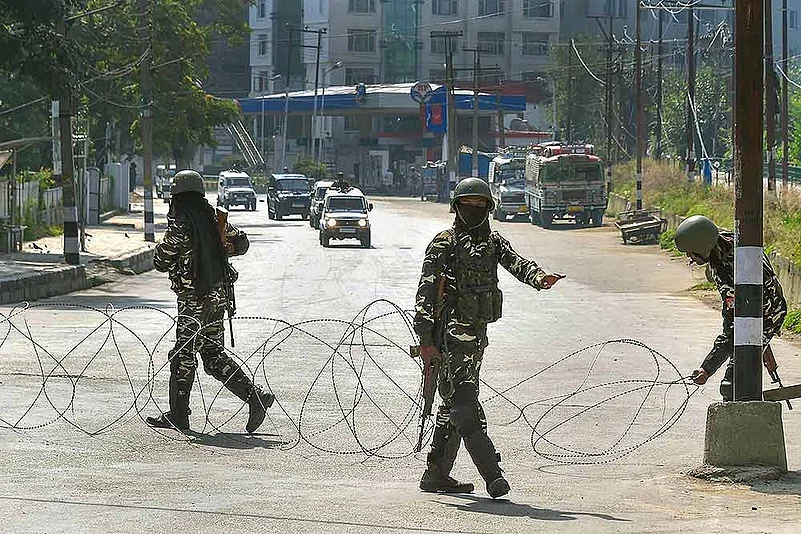Jammu and Kashmir government on Monday notified Jammu and Kashmir Grant of Domicile Certificate (Procedure) Rules, 2020. These rules prescribe the procedure for issuance of Domicile Certificate, which has been made the basic eligibility condition for appointment to any post under the Union Territory of Jammu and Kashmir. Under the rules, 15 days will be required for issuance of the certificate, after which the applicant shall be free to approach an Appellate Authority.
“The decision of the appellate authority shall be binding upon the issuing authority and the orders of the appellate authority are to be complied within seven days, failing which the defaulting officer shall be liable for a penalty of Rs 50,000 out of his salary. The appellate authorities will also have revisional powers. They can, either suo moto or on through an application made, call for records, check the legality of any proceedings and pass appropriate orders in reference,” a government spokesman said.
Advertisement
Reacting to the development, Peoples Democratic Party condemned the new domicile rules, saying, “Even a pandemic is no deterrent for the GOI to continue with its disempowerment project for JK. Orders like the one on domicile certificates don't settle anything, neither do they cover up the August 5, fraud. The demographic change and disenfranchisement will further complicate the J&K issue which has claimed thousands of lives so far. This will be resisted through all democratic, peaceful means.”
On April 1, eight months after abrogation of Articles 370 and 35A, the BJP government notified a law, spelling out new domicile rules for Jammu and Kashmir and eligibility for employment in the region. Under the law, the domiciles have been defined as those who have resided for a period of 15 years in the Union territory of Jammu and Kashmir, those have studied for a period of seven years and appeared in Class 10th /12th examination in educational institutions located in J&K. The government had also reserved jobs for fourth class government position for domiciles of Jammu and Kashmir.
Advertisement
Later, after opposition from Jammu, the centre government on April 3 brought an amendment, leaving government jobs reserved for J&K domiciles.
Before August 5, when Article 370 and Article 35A of Indian constitution were in vogue, all jobs in erstwhile state of J&K were exclusively reserved for permanent residents of the State. Under Article 370, Jammu and Kashmir had a separate constitution, while Article 35A prohibited people from outside the state from buying property in Jammu and Kashmir and ensuring job reservation for permanent residents. Article 35A would empower the Government of J&K to define a class of persons as constituting “permanent residents” of the erstwhile state and allowed the government to confer on them special rights and privileges with respect to matters of public employment and acquisition of immovable property in the state. Annulled Article 35-A was included into the Constitution of India in 1954 by a presidential order made under Article 370 of the Constitution of India.
“Under the Domicile Rules, all those persons and their children who have resided for 15 years in Jammu and Kashmir or have studied for seven years and appeared in class 10th or 12th examination in an educational institution in the UT are eligible for grant of domicile,” the government spokesman said.
“Children of Central Government officials, All India service Officers, officials of PSUs and Autonomous body of Central Government, Public Sector Banks, Officials of Statutory bodies, Officials of Central Universities and recognized research institutes of the Central Government, who have served in the Union territory of Jammu of Kashmir for a total period of ten years, will also be eligible for Domicile status in the UT,” the spokesman said. “Besides, all those migrants and their children who are registered with Relief and Rehabilitation Commissioner will be granted Domicile certificate. Children of those residents of Jammu and Kashmir, who reside outside the Union territory in connection with their employment of business or other professional or vocational reasons, have also become eligible for grant of domicile status,” the government spokesman said.
Advertisement
“The rules have a provision that applications for grant of Domicile Certificate can be submitted either physically or electronically online. The Competent Authority can also issue domicile certificate(s) electronically.”
“However, permanent Residents of the erstwhile State of J&K in whose favour Permanent Resident Certificate (PRC) has been issued by the competent authority before 31.10.2019 shall be eligible for receiving their Domicile Certificates on the basis of PRCs alone and no other additional document shall be required for such residents,” the spokesman added.




















